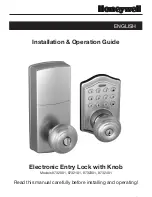
9
Functional description
The HZ-lock VB 19000 multipoint locking system for burglary-resistant leaf doors fulfils all desired func-
tions and requirements. When the door is closed by the door closer, the latch first engages in the striking
plate and positions the door in the locked position, whereupon the three bolts (normally one bolt at the
bottom, centre, and top) automatically extend (automatic locking). When in the extended state, the bolts
are blocked from being pushed back into the lock case. The hardened lock case impedes attempts to drill into
the case.
In the basic state, the lever handle on the outside is disengaged. The coupling of the lever handle to the lok-
king mechanism normally takes place with the integrated electric magnet which can be controlled with any
access control system. As long as the magnet is powered, the lock latch and the bolt are withdrawn when
the handle is actuated. In the process, the bolts remain in place in each retracted position in order to open,
even if they are not entirely retracted with a wide rebate gap. If there is a power failure, or for emergency
opening by rescue workers, the lever handle can also be coupled by means of the security cylinder with the
appropriate security key.
All required control and monitoring contacts are integrated in the HZ-lock VB 19000:
• Separate potential-free lock contacts on the inside and outside lever handles
• Potential-free switchover contact for mechanical handle coupling via the cylinder
• Bolt position contact and leaf position contact for monitoring of the correct locking (the evaluation of
these contacts is strongly recommended).
The lock has satisfied testing requirements at the Material Testing Office in Dortmund in accordance with
DIN 18251-3 Class 4, and thereby fulfils requirements on a lock for increased burglary resistance and high
usage frequency. It has a certificate as an emergency exit lock in accordance with EN 179 with Glutz security
fittings for doors weight up to 400 kg.
Suitable security fittings with suitable divided handle spindles must be used for doors for escape and rescue
route applications. Use of the Glutz twin glide easyfix® bearing is preferred.
Optional: electrical release block for locking
There is a second magnet arranged at the top in the lock case of the main lock which can be used to suppress
the extension of the three bolts as long as voltage is applied to the coil of the magnet.
After voltage is applied to this additional electric magnet, the three bolts and the latch are retracted with
the coupled outside lever handle or the inside lever handle. Then when the doors close, only the lock latch
engages and the three bolts remain retracted. If the current supply to the magnet is interrupted, the bolts
extend when the door is closed.
An electric strike is used for doors with an automatic drive as a counterpiece to the lock case.
Solenoid coil: 12 or 24 VDC, 100% duty ratio, 4.8 watts
N.B. This version in does not correspond to the General appraisal certificate.









































